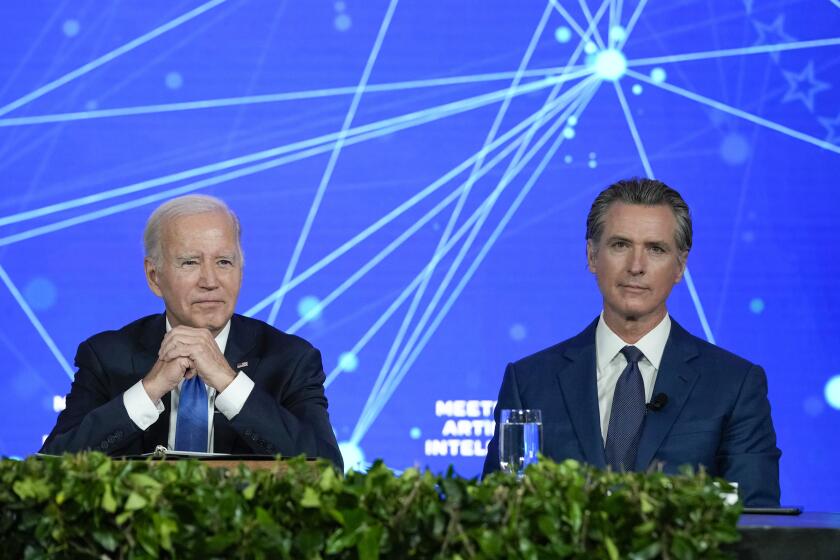Opinion: California and other states are rushing to regulate AI. This is what they’re missing

- Share via
The Constitution shouldn’t be rewritten for every new communications technology. The Supreme Court reaffirmed this long-standing principle during its most recent term in applying the 1st Amendment to social media. The late Justice Antonin Scalia articulated it persuasively in 2011, noting that “whatever the challenges of applying the Constitution to ever-advancing technology, the basic principles of freedom of speech and the press … do not vary.”
These principles should be front of mind for congressional Republicans and David Sacks, Trump’s recently chosen artificial intelligence czar, as they make policy on that emerging technology. The 1st Amendment standards that apply to older communications technologies must also apply to artificial intelligence, particularly as it stands to play an increasingly significant role in human expression and learning.
But revolutionary technological change breeds uncertainty and fear. And where there is uncertainty and fear, unconstitutional regulation inevitably follows. According to the National Conference of State Legislatures, lawmakers in at least 45 states have introduced bills to regulate AI this year, and 31 states adopted laws or resolutions on the technology. Congress is also considering AI legislation.
Writers and other creators see OpenAI’s forthcoming Media Manager as an attempt to evade responsibility for the theft of intellectual property.
Many of these proposals respond to concerns that AI will supercharge the spread of misinformation. While the worry is understandable, misinformation is not subject to any categorical exemption from 1st Amendment protections. And with good reason: As Supreme Court Justice Robert Jackson observed in 1945, the Constitution’s framers “did not trust any government to separate the true from the false for us,” and therefore “every person must be his own watchman for truth.”
California nevertheless enacted a law in September targeting “deceptive,” digitally modified content about political candidates. The law was motivated partly by an AI-altered video parodying Vice President Kamala Harris’ candidacy that went viral earlier in the summer.
Two weeks after the law went into effect, a judge blocked it, writing that the “principles safeguarding the people’s right to criticize government … apply even in the new technological age” and that penalties for such criticism “have no place in our system of governance.”
It’s wishful thinking that Congress and the federal government will put guardrails on AI to reduce the risk of catastrophic harms. California’s Senate Bill 1407 is an important first step in responsible AI development.
Ultimately, we don’t need new laws regulating most uses of AI; existing laws will do just fine. Defamation, fraud, false light and forgery laws already address the potential of deceptive expression to cause real harm. And they apply regardless of whether the deception is enabled by a radio broadcast or artificial intelligence technology. The Constitution should protect novel communications technology not just so we can share AI-enhanced political memes. We should also be able to freely harness AI in pursuit of another core 1st Amendment concern: knowledge production.
When we think of free expression guarantees, we often think of the right to speak. But the 1st Amendment goes beyond that. As the Supreme Court held in 1969, “The Constitution protects the right to receive information and ideas.”
Information is the foundation of progress. The more we have, the more we can propose and test hypotheses and produce knowledge.
The internet, like the printing press, was a knowledge-accelerating innovation. But Congress almost hobbled development of the internet in the 1990s because of concerns that it would enable minors to access “indecent” content. Fortunately, the Supreme Court stood in its way by striking down much of the Communications Decency Act.
Indeed, the Supreme Court’s application of the 1st Amendment to that new technology was so complete that it left Electronic Frontier Foundation attorney Mike Godwin wondering “whether I ought to retire from civil liberties work, my job being mostly done.” Godwin would go on to serve as general counsel for the Wikimedia Foundation, the nonprofit behind Wikipedia — which, he wrote, “couldn’t exist without the work that cyberlibertarians had done in the 1990s to guarantee freedom of expression and broader access to the internet.”
Today humanity is developing a technology with even more knowledge-generating potential than the internet. No longer is knowledge production limited by the number of humans available to propose and test hypotheses. We can now enlist machines to augment our efforts.
We are already starting to see the results: A researcher at the Massachusetts Institute of Technology recently reported that AI enabled a lab studying new materials to discover 44% more compounds. Dario Amodei, the chief executive of the AI company Anthropic, predicts that “AI-enabled biology and medicine will allow us to compress the progress that human biologists would have achieved over the next 50-100 years into 5-10 years.”
This promise can be realized only if America continues to view the tools of knowledge production as legally inseparable from the knowledge itself. Yes, the printing press led to a surge of “misinformation.” But it also enabled the Enlightenment.
The 1st Amendment is America’s great facilitator: Because of it, the government can no more regulate the printing press than it can the words printed on a page. We must extend that standard to artificial intelligence, the arena where the next great fight for free speech will be fought.
Nico Perrino is the executive vice president of the Foundation for Individual Rights and Expression and the host of “So to Speak: The Free Speech Podcast.”
More to Read
A cure for the common opinion
Get thought-provoking perspectives with our weekly newsletter.
You may occasionally receive promotional content from the Los Angeles Times.












